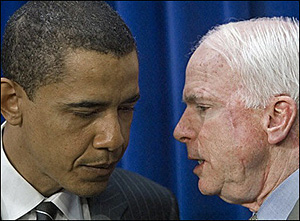
|  |  |  Americas & Beyond | July 2008 Americas & Beyond | July 2008  
US Latin America Policy: McCain vs Obama
 Nathaniel Foote - Diplomatic Courier Nathaniel Foote - Diplomatic Courier
go to original


| | Depending on who wins the presidency in November, Barack Obama or John McCain, each represents a different future for the United States' Latin American policy. | | |
In an effort to prove his foreign policy credentials with respect to Latin America, presidential hopeful and presumptive Republican nominee, John McCain, recently returned from a tour of Mexico and Colombia. That tour was politically fortuitous because he chanced to be present when Ingrid Betancourt and other hostages were rescued. He clearly hoped his visit would do more than provide a platform for press coverage of his policies on issues such as trade, immigration, and drugs; he also hoped it would prove to North, Central, and South Americans alike that he has what it takes, and a willingness, to shape a coherent policy towards the area once in office.

The trip also allowed McCain, adviser and a former assistant secretary of state for the Western Hemisphere to reiterate that "Obama has never set foot in the region," hoping to drive home the point that the Democrat lacks the foreign policy experience to make a good commander in chief. This is a strategy on which Mr McCain has relied heavily. It is debatable whether Americans got the message, faced as they are with a two front war in Iraq and Afghanistan, and with Latin America largely regarded as an afterthought. What isn't debatable, however, is that the future of our relationship with our neighbors to the south depends greatly on who is elected in November.

Obama and McCain differ in their stances toward Latin America. Indeed, Mr McCain is right to say he has more Latin American experience than Mr. Obama. Born in the Panama Canal Zone in 1936, he has watched, and participated in, the evolution of American policy toward the region since arriving on Capitol Hill in the early 1980s. But Mr Obama has countered by saying that despite his lack of physical familiarity with Latin America, he has a new vision for policy toward the region, claiming that Washington has for too long "stuck to tired blueprints on drugs and trade, on democracy and development," and expressing his desire to renegotiate NAFTA and to engage leftist leaders and politicians including Hugo Chavez. He has also expressed an interest in relaxing restrictions on Cuba, a position likely to win him a great deal of support in South Florida's sizeable Cuban population.

The differences between Obama and McCain, however, although important, are neither as numerous nor as deep as the rhetoric suggests, and although their policies toward Cuba and trade contrast starkly (McCain remains strongly committed to NAFTA), on all other fronts the candidates seem to agree.

Both support continuing aid for Plan Colombia to fight drugs and violence, as well as a similar program for Mexico known as the Mιrida Initiative, and both also support sweeping immigration reform, an issue near and dear to the hearts of many Latin Americans. Both candidates have expressed an interest in engaging left wing leaders, and despite a hard line toward Venezuela and Cuba, McCain is open to dealing with "democratic left-wing governments" such as Bolivia.

What makes this election so important for those interested in Latin American policy is perception. Latin Americans tend to see Mr McCain as a George W Bush retread, who will continue policies that neglect the region, or ignore its real problems solely in pursuit of programs intended to combat drugs. Mr Obama, on the other hand, represents a new hope to Latin Americans according to Mexican Congressman Nicolas Morales Ramos, who says that "Obama, especially, is coming with new ideas. It seems like he's young and full of plans and that he's talked about helping migrants more than McCain." This sentiment is not unique to Mexico. Across Latin America people have been heartened by the prospect of an American president of mixed racial descent, whether they know his politics or not. Echoing this feeling a woman from Caracas expressed her excitement about Obama saying, "To have a black president in the US? That has to be a good thing," and she is not alone. In Colombia "many Afro-Colombians are inspired by Obama[
]" says Ann Farnsworth-Alvear, director of Latin American and Latino studies at the University of Pennsylvania, where she says that although there are supporters of both candidates, excitement about Obama "is palpable."

The potentially positive feelings about an Obama victory might have more far reaching consequences than simply providing Latin America with a visible symbol of success in a diverse modern world. In Venezuela, where Hugo Chavez has staked his political career on confrontation with the West - often to divert attention from falling popularity at home - he would likely find it difficult to challenge a President Obama so directly. In the past he has called Bush everything from the devil to a donkey, but he might find such bluster uncomfortable with Mr Obama. "I think that if Obama were elected, that would certainly take a lot of wind out of Chavez's sails," says Nikolas Kozloff, author of the recently published book "Revolution! South America and The Rise of The New Left." On the other hand, however, an Obama victory could actually embolden Chavez, proving he was somehow right all along.

Regardless who wins in November, American policy toward Latin America probably will not change drastically. It will take time even for Mr Obama to extricate America from the entanglements that he proposes to end. Latin America may not want to hold its breath waiting for the attention the region deserves.

This article was published originally at The Diplomatic Courier: A Global Affairs Magazine: in Washington, DC. For more articles, special reports, and global resources please visit www.diplomaticourier.org. |

 |
|  |



